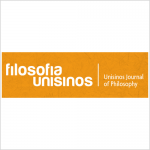On the philosophical foundations of episodic memory as awareness of past events
Vol 19, No 1 (2018) • Filosofia Unisinos - Unisinos Journal of Philosophy
Autor: Nara M. Figueiredo
Resumo:
Mental time travel (MTT) is quite a novel label in Philosophy. The notion was set by experimental psychologist and cognitive neuroscientist Endel Tulving in the 1980s and refers to the ability to be aware of subjective past and future events. Tulving’s view on memory and consciousness provides an important conceptual distinction founded in experimentally observed data. In this paper I discuss (1) his concept of episodic memory as awareness, based on Peter Hacker’s distinction of perception and sensation, and his account of memory, and (2) whether memory can be taken as an own-body subjective perception, which, therefore, challenges the conception of memory as stored information in the brain and the idea that we could somehow perceive our memories. The main puzzle is: if awareness is a conscious state that involves veridical perception of present inner or outer states/events, how can we conceive awareness of past and future events? This discussion aims to contribute to Tulving’s conception of MTT by clarifying the conceptual foundations on which we can understand memory.
ISSN: ISSN: 1984-8234
Texto Completo: http://revistas.unisinos.br/index.php/filosofia/article/view/fsu.2018.191.07
Palavras-Chave: memory,episodic memory,awareness,private expe

Filosofia Unisinos - Unisinos Journal of Philosophy
The journal Filosofia Unisinos - Unisinos Journal of Philosophy is published once every four months by Universidade do Vale do Rio dos Sinos.
Articles must be original, unpublished, and not under consideration for publication anywhere else and can be written in Portuguese, English or Spanish
Filosofia Unisinos - Unisinos Journal of Philosophy prints articles, translations and critical book reviews. It also reprints papers that are considered fundamental to the area when authorized written permission is given by the original publisher.
